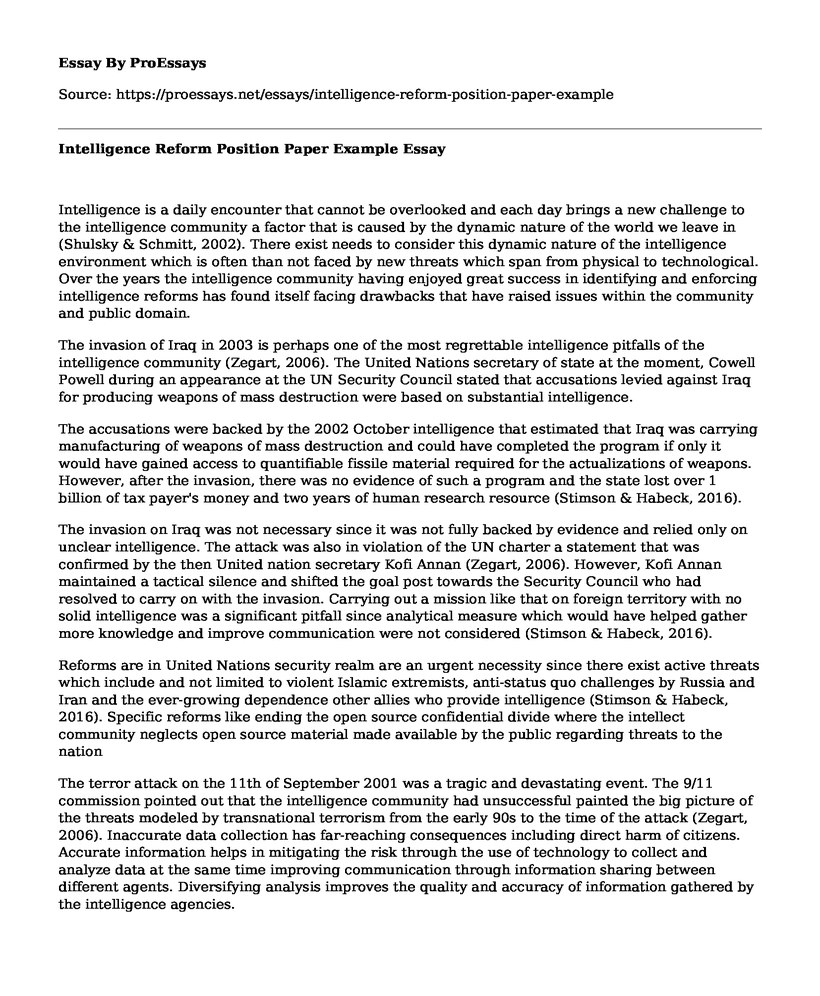Intelligence is a daily encounter that cannot be overlooked and each day brings a new challenge to the intelligence community a factor that is caused by the dynamic nature of the world we leave in (Shulsky & Schmitt, 2002). There exist needs to consider this dynamic nature of the intelligence environment which is often than not faced by new threats which span from physical to technological. Over the years the intelligence community having enjoyed great success in identifying and enforcing intelligence reforms has found itself facing drawbacks that have raised issues within the community and public domain.
The invasion of Iraq in 2003 is perhaps one of the most regrettable intelligence pitfalls of the intelligence community (Zegart, 2006). The United Nations secretary of state at the moment, Cowell Powell during an appearance at the UN Security Council stated that accusations levied against Iraq for producing weapons of mass destruction were based on substantial intelligence.
The accusations were backed by the 2002 October intelligence that estimated that Iraq was carrying manufacturing of weapons of mass destruction and could have completed the program if only it would have gained access to quantifiable fissile material required for the actualizations of weapons. However, after the invasion, there was no evidence of such a program and the state lost over 1 billion of tax payer's money and two years of human research resource (Stimson & Habeck, 2016).
The invasion on Iraq was not necessary since it was not fully backed by evidence and relied only on unclear intelligence. The attack was also in violation of the UN charter a statement that was confirmed by the then United nation secretary Kofi Annan (Zegart, 2006). However, Kofi Annan maintained a tactical silence and shifted the goal post towards the Security Council who had resolved to carry on with the invasion. Carrying out a mission like that on foreign territory with no solid intelligence was a significant pitfall since analytical measure which would have helped gather more knowledge and improve communication were not considered (Stimson & Habeck, 2016).
Reforms are in United Nations security realm are an urgent necessity since there exist active threats which include and not limited to violent Islamic extremists, anti-status quo challenges by Russia and Iran and the ever-growing dependence other allies who provide intelligence (Stimson & Habeck, 2016). Specific reforms like ending the open source confidential divide where the intellect community neglects open source material made available by the public regarding threats to the nation
The terror attack on the 11th of September 2001 was a tragic and devastating event. The 9/11 commission pointed out that the intelligence community had unsuccessful painted the big picture of the threats modeled by transnational terrorism from the early 90s to the time of the attack (Zegart, 2006). Inaccurate data collection has far-reaching consequences including direct harm of citizens. Accurate information helps in mitigating the risk through the use of technology to collect and analyze data at the same time improving communication through information sharing between different agents. Diversifying analysis improves the quality and accuracy of information gathered by the intelligence agencies.
The intelligence should consider using technology that will ensure that every segment of information is combed for clues and trails which combined with classified Intel will yield accurate results (Shulsky & Schmitt, 2002). Deployment of analyst focusing on the current tactical analysis of intelligence and overlooking prolonged thinking and analysis is a reform that requires rethinking. Instead of instilling strategic think tanks with the aim of forecasting and planning for future solutions to the intricate strategic setting that surrounds intelligence gathering.
Conclusion
Intelligence will always have a downside since not all the time is the information gathered is accurate. However, using mechanisms which include analysis tools, closing the open source confidentiality bridge, strategic and tactical forecasting in making intelligent reforms will guarantee the success of the process.
References
Shulsky, A. N., & Schmitt, G. J. (2002). Silent warfare: understanding the world of intelligence. Potomac Books, Inc.
Stimson, C., & Habeck, M. (2016). Reforming Intelligence: A Proposal for Reorganizing the Intelligence Community and Improving Analysis. Retrieved from: https://www.heritage.org/defense/report/reforming-intelligence-proposal-reorganizing-the-intelligence-community-and
Zegart, A. B. (2006). An empirical analysis of failed intelligence reforms before September 11. Political Science Quarterly, 121(1), 33-60.
Cite this page
Intelligence Reform Position Paper Example. (2022, Sep 11). Retrieved from https://proessays.net/essays/intelligence-reform-position-paper-example
If you are the original author of this essay and no longer wish to have it published on the ProEssays website, please click below to request its removal:
- Public Policy on Health Essay
- Police Unions Essay
- Opium Wars and the British East India Company Essay
- Prince George's County Food Equity Council Sustainable Development Strategy - Essay Sample
- Socialism: Sharing Resources, Political Goodwill & Communism - Essay Sample
- US Senators and Congressmen: Five Duties Explained - Essay Sample
- Essay Example on Founding Fathers: The Legacy of the Declaration, Constitution, and Danbury Letter







